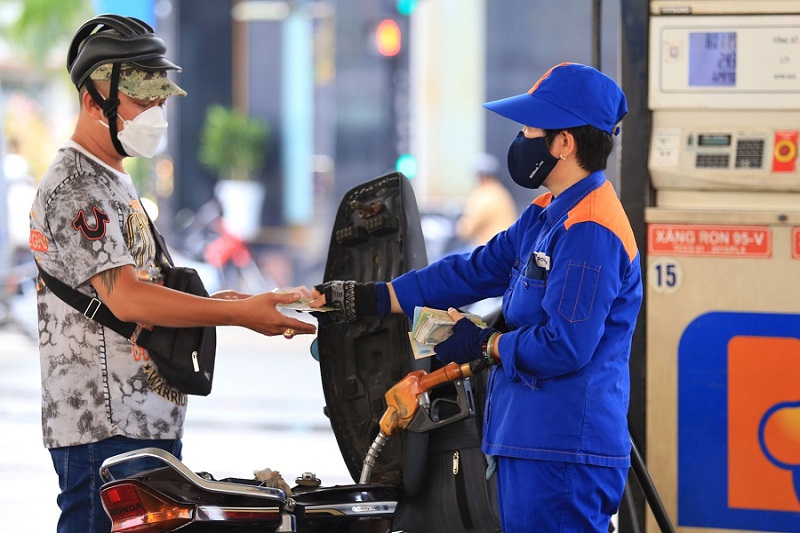The national petroleum fund should be transformed into an energy security fund
Such a status change will expand the nation's capacity for petroleum storage and enhance state authority management.

On July 7, gasoline E5 RON 92 was below 30.891 VND/liter, gasoline RON 95 below 32.763 VND/liter...
Brent crude dropped 2.0% on Wednesday, ending yesterday at $100.69 a barrel. WTI crude for the United States fell 1.0 percent to $98.53 at the end of the day.
In spite of worries about a probable global recession, the price of oil increased slightly on Thursday as investors focused on a tighter supply, according to Reuters. Brent crude futures were trading at $105,37 per barrel, up $4,686, or 4.7%.WTI crude futures in the United States rose $5.11, or 5%, to $103,64 per barrel.
"With Russian oil supplies set to drop as the year progresses and it runs out of Western parts to maintain fields, and with the rest of OPEC hopelessly uninvested in maintaining production capacity, I fear the days of $100 oil will be with us for some time yet," said Jeffrey Halley, a senior market analyst at OANDA.
Businessmen are ready for the Caspian Pipeline Consortium (CPC) to stop delivering oil as a Russian court has ordered a 30-day shutdown of its operations. As part of its efforts to resurrect the 2015 nuclear agreement, the US has tightened sanctions against Iran in response to emerging evidence of a constrained oil supply.
Concerns about an economic recession and the demand for commodities have increased as oil prices have fallen during the past several weeks. According to a recent forecast from Citi Bank, if a recession occurs, oil prices will drop to $65 for the remainder of 2022.
According to a recent report from Ritterbusch and Associates, there is a high possibility that the recession will reduce demand for oil, particularly for gasoline and diesel.
In contrast to the aforementioned forecasts, Goldman Sachs predicted that Brent crude prices would reach $140 per barrel on the London market during the third quarter of 2022. This summer, Goldman Sachs said oil prices should reach $160 a barrel to meet rising demand. JPMorgan Chase & Co. analysts warned that if Russia imposes crude-output limit ations as retribution for G7 sanctions, global oil prices may soar to a dizzying $380 per barrel.
The latest updates on the market for imported petroleum demonstrate that the price of oil is currently lower than it was in the past. Gasoline and oil prices are slightly different from the previous period: 1.300 to 1.400 VND/liter and 1.200 to 1.700 VND/liter, respectively (counted to July 4). Petroleum prices are anticipated to significantly decline in the following adjustment period (11 July) as a result of tax reductions for environmental protection.
On July 7, gasoline E5 RON 92 was below 30.891 VND/liter, gasoline RON 95 below 32.763 VND/liter, diesel below 29.615 VND/liter, petroleum below 28.353 VND/liter, mazut below 19.722 VND/kg.
Mr. Nguyen Minh Phong, an economist, claims that although the Russia-Ukraine conflict and OPEC's strict production controls have disturbed the traditional energy supply, Vietnam's oil price is in line with the trend of the world oil market.
The principle dictates that as the price of commodities with an increasing oil component rises, speculation and artificial scarcity grow, forcing consumers to reduce their expenditure. This might cause the demand-supply gap to close, creating pressure on the labor market and people’s incomes, reducing GDP growth, and making things difficult for both domestic and international businesses.
"The current situation calls for price control using common strategies like supply diversification, supply-shortage replacement, and tax reductions to lower petroleum prices. Hower, the usage of alternative energy should be vigorously adopted and pushed," said Mr. Nguyen Minh Phong.
He adds that Vietnam should transform its national petroleum reserve fund into an energy security fund by leveraging energy storage and diversifying its sources of supply to improve state administration.
"What counts is finding reliable, affordable sources of supplies while avoiding nations under embargo, which will lead to stability and sustainability," Mr. Phong emphasized.








